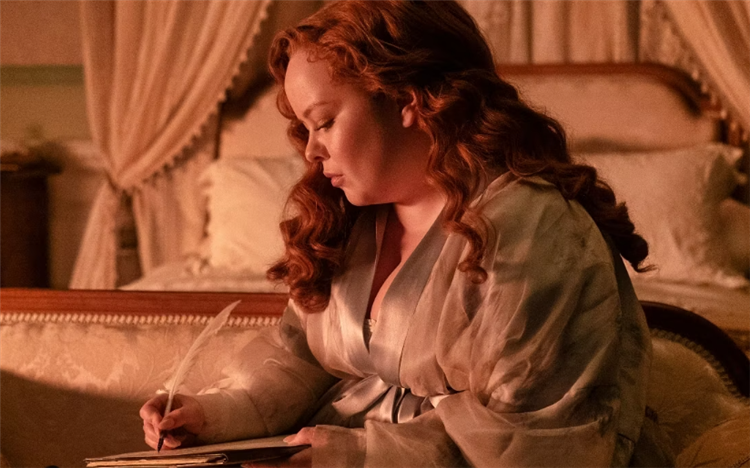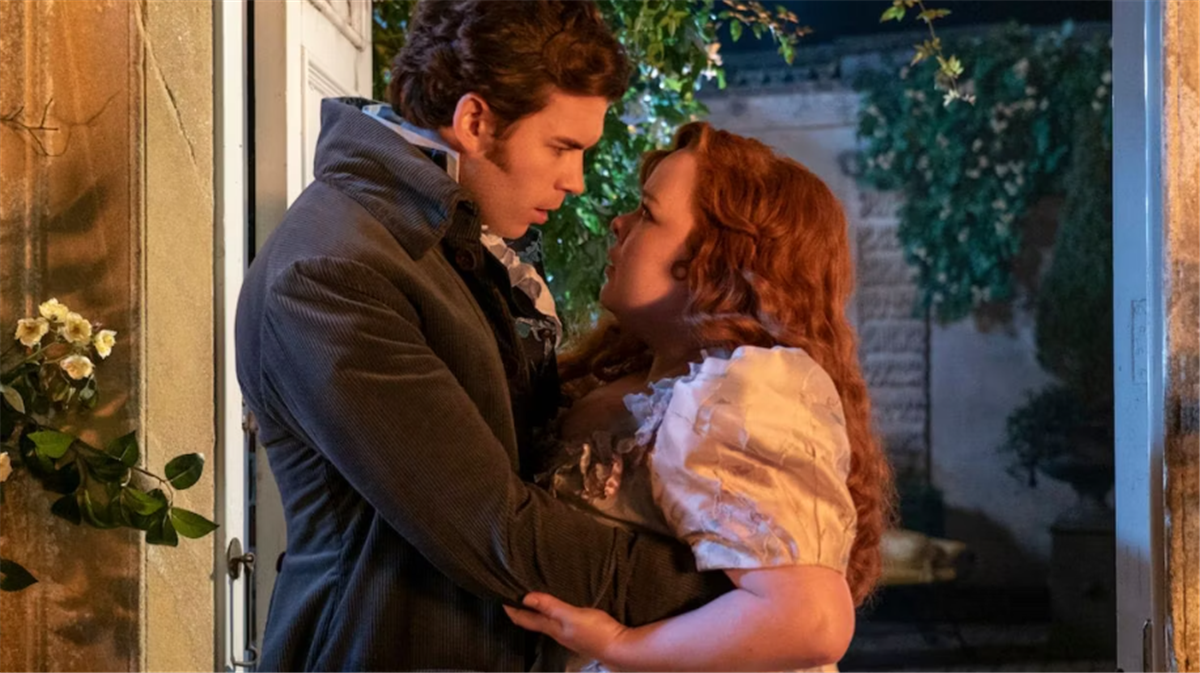With Penelope’s (Nicola Coughlan) character and growth firmly in the limelight in this recent season of Bridgerton, it is hard not to notice that Colin (Luke Newton) isn’t necessarily given the same treatment. Bridgerton has hosted an array of unique characters, with a talented and riveting cast to pull them off, thus giving each love story its own flavor. However, in Season 3, Colin’s character development becomes stunted and forced, especially damning next to the depth and thought put into Penelope’s story. Overall, there are hints of potential within his plot, with notions of an internal conflict based on envy and vague insights into traditional masculinity, but these ideas never really pan out in a fluid way. Instead, Colin resolves all these issues far too quickly, with his growth almost becoming simply another narrative device in Penelope’s story. In fact, he doesn’t really exist outside of Penelope, simply becoming a vehicle for her growth instead of standing as a true character himself.
Colin’s Story Resolves Too Quickly in ‘Bridgerton’ Season 3
The resolution of Colin’s character development arises in a jagged and rudimentary timeline, suddenly wrapping up in the end as a seamlessly encased package for Penelope’s finale. Bridgerton Season 3’s finale sees Colin randomly professing his ambitions to become a writer, though the scenes of him actually writing are few and far between. It seems the sudden interest in this field is carelessly placed into his characterization to complicate his feelings about Penelope being Lady Whistledown (voiced by Julie Andrews). He initially begins to voice his hateful opinions on Lady Whistledown and how she broadcasts hurtful information about his family. While this reason alone should be enough to fuel his rage towards Penelope when he discovers her secret, Bridgerton later implies that he is envious of her success as a writer. This manufactured internal conflict seems nonsensical, especially considering how threadbare his story about loving writing is compared to how prolific it is in Penelope’s scenes.
This writing-based envy doesn’t only aggravate Colin’s anger towards Penelope, but is also one of the reasons he ends up forgiving her. After working through the insecurity of not being able to handle the written word as proficiently as her (something we never actually see in the show, it is just implied in the finale), Colin is able to respect Penelope’s courage in the decision to reveal her identity to the ton. Once again, his ability to resolve his internal conflict does not mark his own character growth and instead becomes a reward for Penelope’s. Penelope’s storyline of growing more confident, accepting herself, and reconciling her identity as a writer with love for Colin all leads to the forgiveness and romance she desperately yearns for. As such, Colin’s character is reduced to a payoff in her story. Bridgerton completely fails Colin, as his abrupt and arbitrary narrative lacks credibility or the thoroughness that was reserved for Penelope, making his resolution far less satisfying.
‘Bridgerton’ Favors Penelope’s Story Over Colin’s

Compared to previous seasons, Bridgerton Season 3 has more of a modern feminist outlook on its plots, particularly as Penelope’s story is reminiscent of how marriage can threaten a working woman’s success. Subsequently, the notion of tackling gender theory is also littered in Colin’s storyline yet is not given the same complexity or screen time. During the first part of Season 3, there is a fleeting moment where Colin challenges the frivolous culture of young bachelors and how they treat women’s bodies. He had previously engaged in the same culture, but when he begins to experience unbidden dreams and thoughts about Penelope, he is able to recognize the superficial nature of his peers. However, this idea is limited to that ephemeral scene, completely vanishing as Colin cultivates his obsession with Penelope.
This deconstruction of traditional masculinity is also later referenced in the finale, where Colin is not only envious of Penelope’s success but also threatened by it. The Regency period’s strict social environment demanded that men should be able to financially provide for their wives and family, becoming the pillar of stability for the household. As such, with Penelope already having the proven ability to make her own money, Colin’s economic responsibility and masculine role becomes threatened, further alienating him from Penelope. But for something that is ingrained into society, it is a miracle that it isn’t more of a scandal in the ton, or that Colin is able to swiftly come to terms with the idea of Penelope being a household name. This not only undermines Bridgerton’s attempt to engage with gender roles but further stunts Colin’s potential character growth, as all this deconstruction of societal values either happens off-screen or is just instantaneous.
This deconstruction of traditional masculinity is also later referenced in the finale, where Colin is not only envious of Penelope’s success but also threatened by it. The Regency period’s strict social environment demanded that men should be able to financially provide for their wives and family, becoming the pillar of stability for the household. As such, with Penelope already having the proven ability to make her own money, Colin’s economic responsibility and masculine role becomes threatened, further alienating him from Penelope. But for something that is ingrained into society, it is a miracle that it isn’t more of a scandal in the ton, or that Colin is able to swiftly come to terms with the idea of Penelope being a household name. This not only undermines Bridgerton’s attempt to engage with gender roles but further stunts Colin’s potential character growth, as all this deconstruction of societal values either happens off-screen or is just instantaneous.
Colin Does Not Exist Without Penelope in ‘Bridgerton’
This lack of effective development could also be attributed to the fact that Colin’s character doesn’t necessarily exist outside his romance with Penelope. Instead of being his own person, his identity, and storyline are intrinsically linked to Penelope’s story, essentially becoming a narrative device to further propagate her growth and their romance. At each point of the series, Colin’s characterization is designed for Penelope’s story to elicit a bigger impact. His initial play-boy demeanor, as he flirts with the ladies of the ton and recites his worldly travels, spurs Penelope to make her transformation and become more outwardly involved in the ton. His obsession with and then his hatred for Penelope adds to her emotional turmoil, from the guilt of being Lady Whistledown to her identity crisis. And, as mentioned before, his abrupt internal resolution simply becomes a reward for Penelope, essentially turning him into a trophy.
It seems like Bridgerton may be trying to subvert gender roles, with Colin taking on the role of the trophy wife whose identity is constructed to facilitate the protagonist’s story. However, Bridgerton’s past romances have all worked so effectively because they were love stories between two independent and dynamic characters. As such, depriving Colin of the same treatment does the series and their romance a disservice, making it secondary to Penelope’s love story with herself. With his one-note personality traits, sporadic inclusion of internal conflicts, and forced revelations, Colin becomes a whimper of the character he could potentially be. With Penelope’s characterization being so compelling, it is a crime that her love interest becomes one-dimensional.
Bridgerton is available now to stream on Netflix in the U.S.
